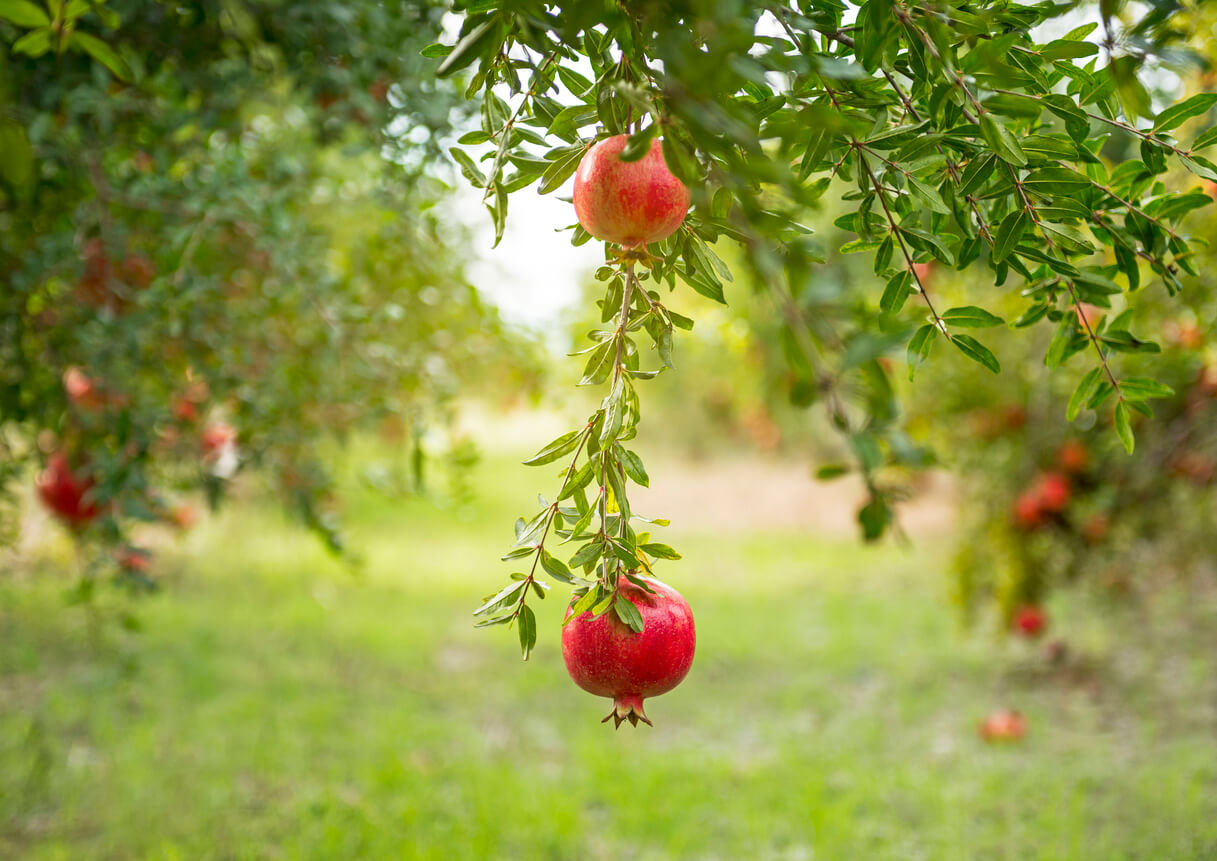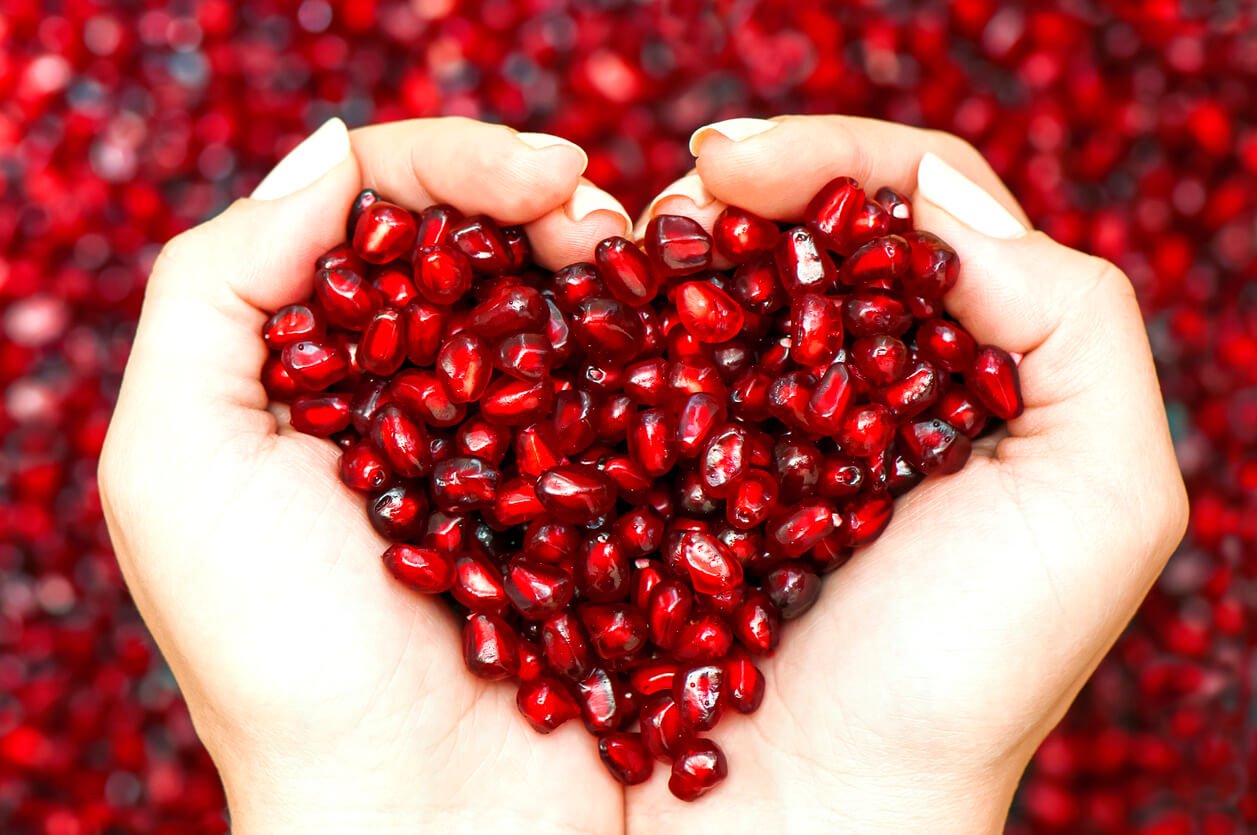Even ancient writings demonstrate how popular pomegranates have been in
centuries past. Many have described pomegranate as a sacred fruit that provided fertility, abundance, and luck to their people. The pomegranate is also a common symbol used in Armenian and Persian cultures, signifying authority over death and protection against the evil eye. And today, many wellness influencers have bestowed superfood status upon it.In this article, we’ll look at the science and practicalities of pomegranate consumption. How healthy are pomegranates for you? Is it good to drink pomegranate juice? What about their impact on the environment? And how exactly do you eat one (without making a mess)?
What Are Pomegranates?

The pomegranate is a spherical fruit with a “crown” that grows on a tree originally native to Iran, the Armenian highlands, and northern India. Today Iran, the world’s largest producer of pomegranates, grows over 740 different varieties of the fruit.
Pomegranates are categorized as a fleshy berry (which is easier to say five times fast than I predicted), but they actually belong to their own botanical family, called Punicaceae. While the most common color of pomegranate is red, the fruit also comes in pink, yellow, and white. The fruit’s intense color, and that of its juice, comes from antioxidant flavonoid compounds called anthocyanins. The different varieties of pomegranate also range in flavor from sweet to sour. Sadly, I’ve never come across white pomegranates, which are apparently super sweet compared to their red and pink counterparts.
Have you ever had the urge to count the arils in a pomegranate? Me neither. But an early estimate from the Jewish tradition puts the exact number at 613, which is the same as the number of commandments in the Torah. Hence the fruit is commonly consumed on the Jewish New Year, reminding adherents of their intentions for the coming 12 months. Botanists who’ve counted the arils give a wider range between 200 to 800 — depending on the individual fruit. The clear, reddish fruit flesh of the aril surrounds a tiny, crisp seed, and the whole seed is edible.
Pomegranate Nutrition

Pomegranates are often called nutritional superfoods, and for good reason. They’re high in phytochemicals and antioxidants such as flavonols — and the anthocyanins that give them their pigment. In fact, research has found that the pomegranate has an antioxidant potential even greater than that found in red wine or green tea, two other foods renowned for their superfood status.
These colorful fruits also contain a number of important vitamins and minerals. For instance, they’re a good source of vitamin C, vitamin K1, potassium, and folate. One medium-sized pomegranate offers around 11 grams of fiber. And if you wondered whether fruits have protein, a pomegranate contains a whopping five grams. (Not bad for a fruit that’s also 82% water!)
The seeds encapsulated in the arils also contain a number of antioxidants as well as a unique fatty acid called punicic acid, which may have benefits for reducing inflammation and insulin resistance, according to some animal studies.
Keep in mind that it’s the pomegranate arils — not the juice alone — that provide the fiber and the protein. Plus, when pomegranates are processed into juice, much of their water-soluble B vitamins and vitamin C, as well as some other minerals, are reduced or lost. And while both the arils and the juice contain a considerable amount of sugar, both forms are considered to be low to mid-range on the glycemic index, meaning that they’re not going to spike your blood sugar dramatically after consuming them. Still, I’d recommend eating the whole arils, including the seeds inside, to get the most nutrition.
Pomegranate Benefits

While pomegranates are undoubtedly nutrient-packed, most of the studies conducted on them have either used a fruit extract, pomegranate juice, or a pomegranate seed oil, as opposed to the whole fruit. These studies test the effectiveness of pomegranate compounds against a certain ailment, such as cancer.
Whole fruit extract would likely be the closest thing to eating a whole pomegranate, but the studies may use extracts from arils, the peel, juice, or extracted polyphenols from the fruit. So, while certain beneficial effects from these studies can’t necessarily be applied to the whole fruit, that doesn’t mean including the fruit in your diet is a bad idea. In fact, given what we know about the synergistic effects of the compounds in whole foods, it’s entirely possible (perhaps likely) that eating pomegranate seeds along with the juices surrounding the seeds confers even more benefit than these studies suggest.
Some of the benefits of pomegranate compounds seen in studies include the following:
1. May have anticancer properties.
A number of human, lab, and animal studies have examined the potential role of pomegranate in the treatment of breast, prostate, lung, colon, skin, and liver cell cancers. Pomegranate shows promising anticancer properties, which may come from the antioxidant and polyphenolic compounds in the fruit’s peel, seed oil, and juice.
Pomegranate extract has demonstrated anti-tumor activity in multiple organs and shown cancer-preventive properties. Some animal studies have seen pomegranate extract help inhibit prostate and lung tumor growth. And one human trial found that pomegranate juice consumption helped slow biomarkers of prostate cancer progression. Pomegranate seed oil has also shown promise in preventing colon cancer and reducing breast cancer growth in rat models.
And a 2018 review from Oncology Reviews stated that all parts of the pomegranate have been found to show anticancer activity through a variety of research, and should continue to be studied.
2. May be good for your heart.
Pomegranate juice is rich in polyphenols with antioxidant activity that may be heart protective. Studies have found that they help to prevent the activity of serum angiotensin-converting enzyme (it’s a good thing we don’t have to be versed in biochemistry to reap the benefits of eating healthy food!) and reduce systolic blood pressure — two heart disease risk factors.
The main bioactive component of pomegranate seed oil, punicic acid, has been shown to help prevent the buildup of plaque in the arteries. And a 2010 human study observed the ability of 800 mg of pomegranate seed oil per day to reduce triglycerides significantly among adults with hyperlipidemia.
Other studies have seen two to 14 weeks of pomegranate juice consumption help reduce the formation of LDL (“bad”) cholesterol levels among humans and animals. And in another study, concentrated pomegranate juice given to people with diabetes and hyperlipidemia was able to significantly reduce a number of potentially problematic blood fats. And pomegranate leaf extract given to obese, hyperlipidemic mice for five weeks (I hate to think of what was done to them to make them obese and hyperlipidemic) was able to reduce body weight, total cholesterol, triglycerides, and fasting blood sugar levels.
3. May offer anti-inflammatory benefits.
Many of the health benefits of pomegranates demonstrated in human, lab, and animal studies may be due to the fruit’s anti-inflammatory compounds. Given that inflammation is a key factor underlying most of the major chronic diseases of our times, this is promising news.
One study found that urolithins, compounds made in your gut when you consume ellagic acid (found abundantly in pomegranates), can help inhibit brain inflammation. In fact, the anti-inflammatory benefits of pomegranate may help prevent the development of neurodegenerative diseases like Alzheimer’s. Punicalagin, another polyphenolic compound in pomegranates, may also have anti-inflammatory activity that helps prevent memory impairment.
4. May help improve blood glucose control.
Research has found that pomegranate juice and its components may offer positive effects on blood sugar for some people. The polyphenols and the antioxidant compounds in pomegranates may help to control type 2 diabetes.
For instance, polyphenols in pomegranate juice may help reduce postprandial hyperglycemia (meaning “high blood sugar after eating”), which is linked to type 2 diabetes. Clinical studies among people with type 2 diabetes have also found that pomegranate seed oil can help reduce fasting blood sugar.
5. May be skin protective.
Pomegranate may help protect against sun-induced skin damage, including the risk of skin cancers. In one study, the activities of pomegranate juice, extract, and seed oil were examined against ultraviolet skin damage. All of them appeared to offer protective benefits. And the direct topical application of ellagic acid decreased the production of inflammatory compounds on the skin.
6. May be good for your oral health.
Your mouth is full of germs, but the good news is that eating a healthy diet may keep problematic ones at bay — and pomegranate may help.
One study observed the anti-plaque effects of pomegranate mouth rinse, which could be helpful in preventing cavities. And in another study, a hydroalcoholic pomegranate extract induced an 84% reduction in dental plaque microorganisms.






Комментариев нет:
Отправить комментарий